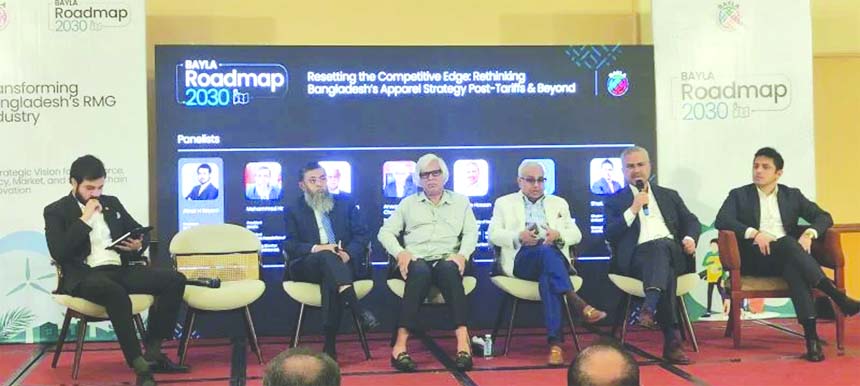Apparel leaders want incentive on US cotton to reduce trade gap

Business Report :
Apparel industry leaders have urged the government to reduce the trade imbalance between Bangladesh and the United States and emphasized the need to offer an additional incentive to help offset the higher cost of importing cotton from the United States.
They made the appeal at a discussion, titled “BAYLA Roadmap 2030: Resetting the Competitive Edge, Rethinking Bangladesh’s Apparel Industry”, organised by the Bangladesh Apparel Youth Leaders Association (BAYLA) held at a hotel in the capital yesterday.
The industry leaders also put emphasis on addressing high air freight costs and inefficiencies at ports to expedite further the trade growth.
Mohammad Hatem, president of the Bangladesh Knitwear Manufacturers and Exporters Association (BKMEA), called for a reduction in tariffs to prepare for post-LDC graduation and challenges from US tariffs. High duties on imported man-made fibres remain a concern, he said.
He also highlighted the existing challenges within the banking sector and various other areas, including the National Board of Revenue (NBR) and customs.
Hatem said, “The government has, however, initiated measures to address these issues in certain sectors, particularly concerning the NBR.”
Envoy Textile Limited Chairman Kutubuddin Ahmed noted that US cotton costs about four cents more per pound than cotton from other sources.
He said importers could be encouraged to buy from the US if the government adjusted its current incentive scheme accordingly.
“If the government gives us this amount of extra money as an incentive for importing US cotton instead of the existing cash incentive, then entrepreneurs will be encouraged to import cotton from there,” said Kutubuddin, also a former president of the BGMEA.
Anwar-ul-Alam Chowdhury Parvez, former BGMEA president, underscored the need for addressing high interest rates, rising utility prices and bureaucratic delays at ports.
He said Bangladesh is often labeled as a country of cheap labour, but if the country’s situation is compared with Vietnam, then it could be found that their transport, interest rates, logistics and other associated costs are significantly lower.
Importers also called for reduced harassment at customs, faster clearance at ports, and improved infrastructures to maintain Bangladesh’s export competitiveness.
BTMA President Mr. Showkat Aziz Russell chaired the session and emphasized the need to reduce the trade imbalance between Bangladesh and the United States. He proposed leveraging Bangladesh’s status as a major importer of U.S. cotton by manufacturing cotton-based garments for duty-free access to the U.S. market. He also called for robust government support-both financial and policy-based-and greater foreign direct investment (FDI) to create employment and enhance competitiveness in the textile sector.
Bangladesh currently faces tariff rates as high as 37 percent, compared to India (26 percent), Pakistan (29 percent), and Indonesia (32 percent), placing its exports at a competitive disadvantage. Despite being a major buyer of U.S. cotton, Bangladesh receives limited trade preferences-a gap that participants stressed must be addressed through strategic engagement.
The U.S. remains Bangladesh’s largest export destination, accounting for nearly 20 percent of total Ready-Made Garment (RMG) exports, valued at USD 7.34 billion in 2024.
BTMA Vice Presidents Mr. Abul Kalam and Mr. Md. Saleudh Zaman Khan, along with Directors Mr. Md. Masud Rana, Mr. Abdullah Al Mamun, Mr. Md. Shahid Alam, Mr. Md. Kamrul Hassan, Mr. Hossain Mehmood, Mr. Matiur Rahman. Among others Mr. Kutubuddin Ahmed Former President, BGMEA and Member, Advisory Board, BTMA and Mr. Mohammad Helal Mia (Chairman, Amanat Shah Group and Member, Advisory Board, BTMA) were also present the event.
